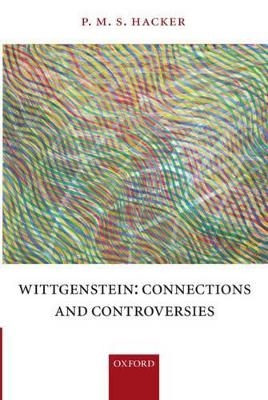
Wittgenstein: Connections and Controversies
Seiten
2004
Oxford University Press (Verlag)
978-0-19-927113-9 (ISBN)
Oxford University Press (Verlag)
978-0-19-927113-9 (ISBN)
These essays on different aspects of the philosophy of Wittgenstein offer an overview followed by essays which: investigate connections between the philosophy of Wittgenstein and other philosophers or philosophical trends over the last two decades, have raged over the interpretation of one aspect or another of Wittgenstein's writings.
Wittgenstein: Connections and Controversies consists of thirteen thematically linked essays on different aspects of the philosophy of Wittgenstein, by one of the leading commentators on his work. After an opening overview of Wittgenstein's philosophy the following essays fall into two classes: those that investigate connections between the philosophy of Wittgenstein and other philosophers and philosophical trends, and those which enter into some of the controversies that, over the last two decades, have raged over the interpretation of one aspect or another of Wittgenstein's writings.
The connections that are explored include the relationship between Wittgenstein's philosophy and the humanistic and hermeneutic traditions in European philosophy, Wittgenstein's response to Frazer's Golden Bough and the interpretation of ritual actions, his attitude towards and criticisms of Frege (both in the Tractatus and in the later philosophy), the relationship between his ideas and those of members of the Vienna Circle on the matter of ostensive definition, and a comparison of Carnap's conception of the elimination of metaphysics and of Strawson's rehabilitation of metaphysics with Wittgenstein's later criticisms of metaphysics.
The controversies into which Hacker enters include the Diamond-Conant interpretation of the Tractatus (which is shown to be inconsistent with the text of the Tractatus and with Wittgenstein's explanations of and comments on his book), Winch's interpretation of the Tractatus conception of names, Kripke's interpretation of Wittgenstein's discussion of following a rule (which is demonstrated to be remote from Wittgenstein's intentions), and Malcolm's defence of the idea that Wittgenstein claimed that mastery of a language logically requires that the language be shared with other speakers.
These far-ranging essays, several of them previously unpublished or difficult to find, shed much light upon different aspects of Wittgenstein's thought, and upon the controversies which it has stimulated.
Wittgenstein: Connections and Controversies consists of thirteen thematically linked essays on different aspects of the philosophy of Wittgenstein, by one of the leading commentators on his work. After an opening overview of Wittgenstein's philosophy the following essays fall into two classes: those that investigate connections between the philosophy of Wittgenstein and other philosophers and philosophical trends, and those which enter into some of the controversies that, over the last two decades, have raged over the interpretation of one aspect or another of Wittgenstein's writings.
The connections that are explored include the relationship between Wittgenstein's philosophy and the humanistic and hermeneutic traditions in European philosophy, Wittgenstein's response to Frazer's Golden Bough and the interpretation of ritual actions, his attitude towards and criticisms of Frege (both in the Tractatus and in the later philosophy), the relationship between his ideas and those of members of the Vienna Circle on the matter of ostensive definition, and a comparison of Carnap's conception of the elimination of metaphysics and of Strawson's rehabilitation of metaphysics with Wittgenstein's later criticisms of metaphysics.
The controversies into which Hacker enters include the Diamond-Conant interpretation of the Tractatus (which is shown to be inconsistent with the text of the Tractatus and with Wittgenstein's explanations of and comments on his book), Winch's interpretation of the Tractatus conception of names, Kripke's interpretation of Wittgenstein's discussion of following a rule (which is demonstrated to be remote from Wittgenstein's intentions), and Malcolm's defence of the idea that Wittgenstein claimed that mastery of a language logically requires that the language be shared with other speakers.
These far-ranging essays, several of them previously unpublished or difficult to find, shed much light upon different aspects of Wittgenstein's thought, and upon the controversies which it has stimulated.
1. Wittgenstein - an Overview ; 2. Wittgenstein and the Autonomy of Humanistic Understanding ; 3. Developmental Hypotheses and Perspicuous Representations: Wittgenstein on Frazer's Golden Bough ; Postscript ; 4. Was he Trying to Whistle it? ; 5. When the Whistling had to Stop ; 6. Naming, Thinking, and Meaning in the Tractatus ; Postscript ; 7. Frege and the Early Wittgenstein ; 8. Frege and the Later Wittgenstein ; 9. Wittgenstein and the Vienna Circle: The Exaltation and Deposition of Ostensive Definition ; 10. On Misunderstanding Wittgenstein: Kripke's Private Language Argument ; 11. Malcolm on Language and Rules ; 12. On Carnap's Elimination of Metaphysics ; 13. On Strawson's Rehabilitation of Metaphysics ; Index
| Erscheint lt. Verlag | 1.4.2004 |
|---|---|
| Verlagsort | Oxford |
| Sprache | englisch |
| Maße | 156 x 233 mm |
| Gewicht | 581 g |
| Themenwelt | Geisteswissenschaften ► Philosophie ► Metaphysik / Ontologie |
| Geisteswissenschaften ► Philosophie ► Philosophie der Neuzeit | |
| Geisteswissenschaften ► Philosophie ► Sprachphilosophie | |
| Sozialwissenschaften | |
| ISBN-10 | 0-19-927113-5 / 0199271135 |
| ISBN-13 | 978-0-19-927113-9 / 9780199271139 |
| Zustand | Neuware |
| Haben Sie eine Frage zum Produkt? |
Mehr entdecken
aus dem Bereich
aus dem Bereich
Buch | Hardcover (2024)
Matthes & Seitz (Verlag)
CHF 41,90
Über konstruktivistisches Denken in der Theologie
Buch | Softcover (2024)
Verlag Herder
CHF 79,95


